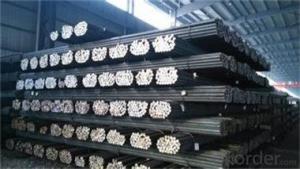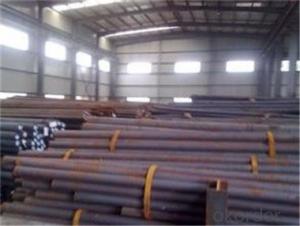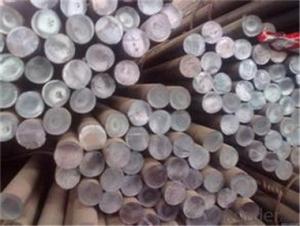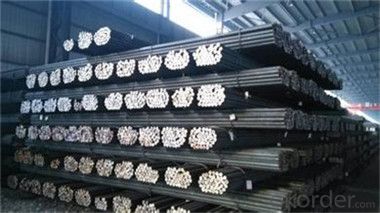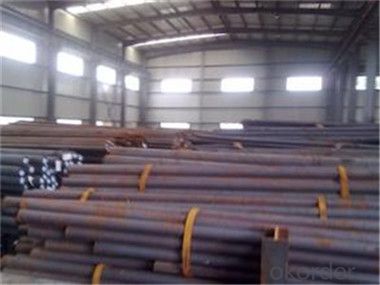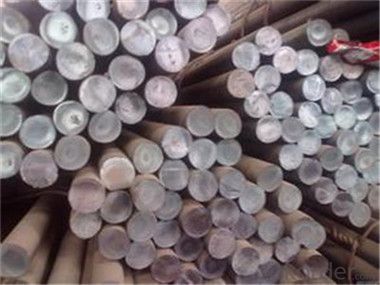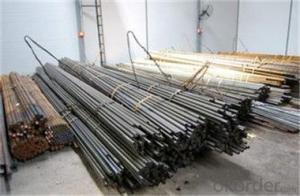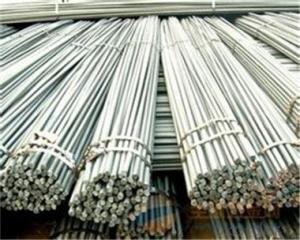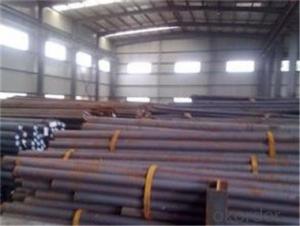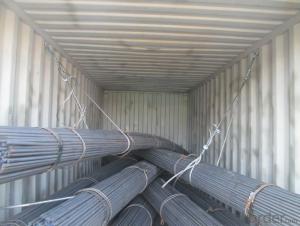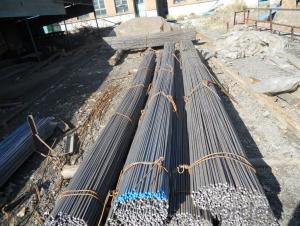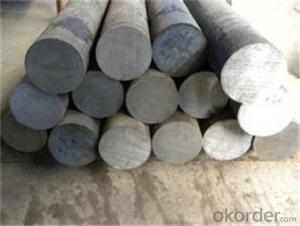Hot Rolled Steel Rod Price Steel Round Bar China
- Loading Port:
- Tianjin
- Payment Terms:
- TT OR LC
- Min Order Qty:
- 990 m.t.
- Supply Capability:
- 2000000 m.t./month
OKorder Service Pledge
OKorder Financial Service
You Might Also Like
Description of steel round bar:
(1) Thickness of not more than 2MM sheet, efficient blanking die, punch die and pressure die etc.
(2) All kinds of scissors, inserts, woodworking blade.It is used in the manufacture of a higher strength and higher quenching and tempering section of the 35CrMo steel, like big locomotive traction gears, supercharger drive gear, rear axle, the connecting rod and the spring load greatly clip,
Festures of steel round bar:
1.Dia 80-800mm Length:2000-13000mm or as required
2.Technique:Forged
3.Delivery Time:45 days
Specifications of steel round bar:
Round bar | Diameter(mm) | Length (mm) | |
10~800 | 2000~5800 | ||
plate/sheet | Thickness(mm) | Width (mm) | Length (mm) |
10~800 | 80~2300 | 2000~5800
|
Images of steel round bar:
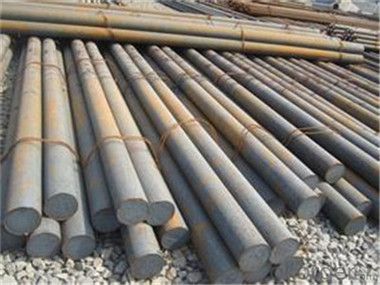
FAQ:
1. What is your package?
Packing situation: standard seaworthy packing or as customer required.
2. How long is the lead time?
Delivery time: 45 days after order confirmed.
3. What payment term do you accept?
Payment: T/T or L/C at sight.
- Q: Are steel round bars available in different surface finishes?
- Yes, steel round bars are available in different surface finishes. The surface finish of a steel round bar refers to the treatment or coating applied to the surface to enhance its appearance, protect it from corrosion, or improve its performance in specific applications. Common surface finishes for steel round bars include polished, brushed, mill finish, galvanized, and coated with materials like chrome, nickel, or zinc. These different surface finishes cater to various requirements and preferences in terms of aesthetics, protection against corrosion, and functionality in different industries and applications.
- Q: How are steel round bars used in the manufacturing of heat exchangers?
- Steel round bars are commonly used in the manufacturing of heat exchangers as they provide structural support and durability to the equipment. These bars are often used as the framework or as internal support for the heat exchanger's core, ensuring stability and longevity. Additionally, steel round bars can be machined or formed into various shapes to accommodate specific design requirements, allowing for efficient heat transfer and optimal performance of the heat exchanger.
- Q: What are the different types of tests performed on steel round bars for quality control?
- There are several types of tests performed on steel round bars for quality control. These include visual inspection, dimensional checks, surface roughness evaluation, hardness testing, tensile testing, impact testing, and chemical composition analysis. These tests help ensure that the steel round bars meet the required quality standards and are fit for their intended applications.
- Q: What are the different grades of heat-treated steel round bars?
- The different grades of heat-treated steel round bars include, but are not limited to, AISI 4140, AISI 4340, AISI 8620, and ASTM A105.
- Q: How do steel round bars contribute to sustainable construction?
- Steel round bars contribute to sustainable construction in several ways. Firstly, steel is a highly durable and long-lasting material, which means that structures built using steel round bars have a longer lifespan and require less maintenance and repairs over time. This reduces the need for frequent replacement, thereby conserving resources and reducing waste. Secondly, steel is a recyclable material, and steel round bars can be easily recycled and reused in other construction projects. By promoting the use of recycled steel, we can reduce the demand for raw materials and minimize the environmental impact associated with steel production. Additionally, steel round bars offer excellent structural strength and flexibility, allowing for more efficient designs and optimized use of materials. This results in lighter and more sustainable structures that require fewer resources to construct. Lastly, steel round bars are often used in reinforced concrete structures, which can enhance the durability and seismic resistance of buildings. By utilizing steel reinforcement, we can ensure the longevity and safety of structures, reducing the need for reconstruction and enhancing the resilience of our built environment. Overall, steel round bars contribute to sustainable construction by promoting durability, recyclability, resource efficiency, and improved structural performance in buildings and infrastructure projects.
- Q: Are steel round bars suitable for the production of bearings?
- Steel round bars are unsuitable for bearing production. Bearings necessitate materials with specific properties, including high hardness, wear resistance, and a low friction coefficient. Steel round bars lack these characteristics in their raw form and would require additional processing and treatments to acquire the necessary properties for bearing production. Bearing materials are generally chosen from alloys like stainless steel, chrome steel, or ceramic materials that are designed to withstand challenging conditions and offer optimal performance.
- Q: What is the maximum sulfur content allowed for steel round bars?
- The maximum sulfur content allowed for steel round bars can vary depending on the specific grade and specification. In general, the sulfur content in steel is controlled to ensure good machinability and overall quality of the material. For most commercial grades of steel round bars, the maximum sulfur content is typically limited to around 0.05% to 0.08%. However, it is important to note that certain specialized grades or applications may have different limits or requirements. It is always advisable to consult the relevant standards or specifications for the specific grade of steel round bars to determine the maximum sulfur content allowed.
- Q: Can steel round bars be used for making security grilles?
- Certainly! Security grilles can be made using steel round bars. Steel, being a sturdy and durable material, offers excellent protection for windows and doors. By welding round bars together, a robust framework for the security grilles can be created. Moreover, steel round bars are highly customizable and can be shaped to fit any size or design requirement, making them suitable for various types of security grilles. The hardness and toughness of steel also make it resistant to cutting or tampering, thereby enhancing the security features of the grilles. All in all, steel round bars are a dependable option for creating security grilles due to their strength, durability, and customization capabilities.
- Q: Are steel round bars resistant to impact?
- Yes, steel round bars are generally resistant to impact due to their high strength and durability. They can withstand significant force without deforming or breaking, making them suitable for applications where impact resistance is required.
- Q: What are the different types of steel round bar surface finishes for improved lubricity?
- There are several different types of steel round bar surface finishes that can be used to improve lubricity. 1. Smooth Finish: This is the most basic type of finish, where the surface of the round bar is made smooth through processes like grinding or polishing. A smooth finish helps to reduce friction and provides a good base for applying lubricants. 2. Chrome Plating: Chrome plating involves electroplating a layer of chromium onto the surface of the round bar. This creates a hard, smooth, and corrosion-resistant surface that provides excellent lubricity. Chrome plating is commonly used in applications where low friction and wear resistance are required. 3. Nitriding: Nitriding is a surface hardening process that involves diffusing nitrogen into the surface of the round bar. This creates a hard layer that enhances the lubricity of the steel. Nitriding is often used in applications where high wear resistance and improved lubrication are important. 4. Black Oxide: Black oxide is a chemical conversion coating that forms a black surface on the steel round bar. This finish provides a thin layer of protection against corrosion and also improves lubricity. Black oxide is commonly used in applications where lubricity is essential but a decorative appearance is not required. 5. Teflon Coating: Teflon coating, also known as PTFE (polytetrafluoroethylene) coating, involves applying a thin layer of Teflon onto the surface of the round bar. This coating provides excellent lubricity and low friction properties. Teflon coating is often used in applications where non-stick properties are required, such as in food processing or packaging industries. These are just a few examples of the different types of steel round bar surface finishes that can be used to improve lubricity. The choice of finish depends on the specific application requirements and the desired level of lubrication and wear resistance.
Send your message to us
Hot Rolled Steel Rod Price Steel Round Bar China
- Loading Port:
- Tianjin
- Payment Terms:
- TT OR LC
- Min Order Qty:
- 990 m.t.
- Supply Capability:
- 2000000 m.t./month
OKorder Service Pledge
OKorder Financial Service
Similar products
Hot products
Hot Searches
Related keywords
